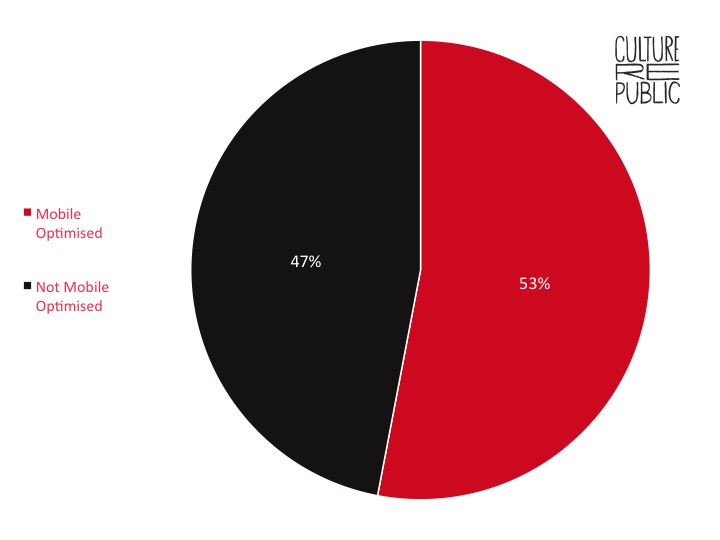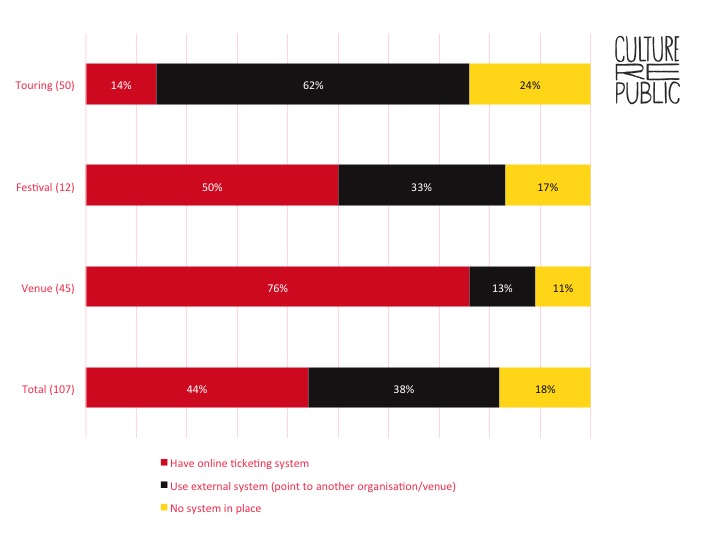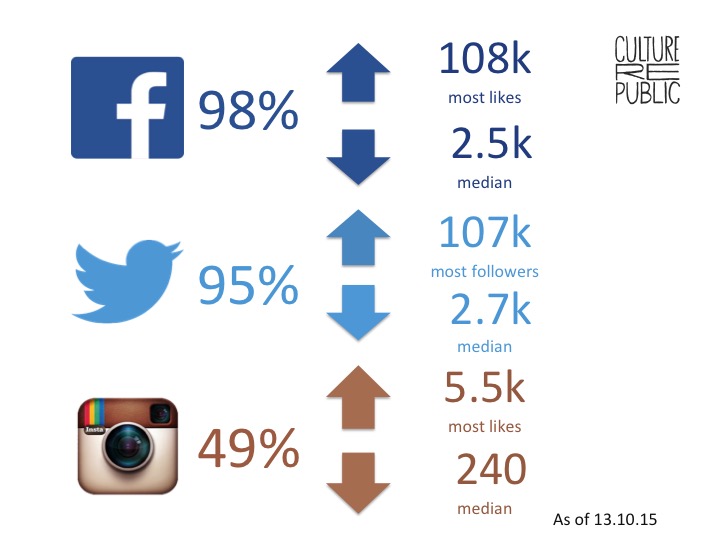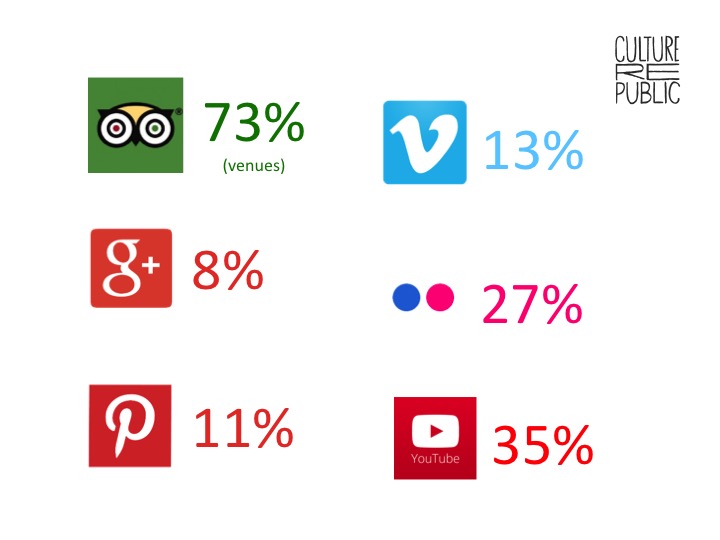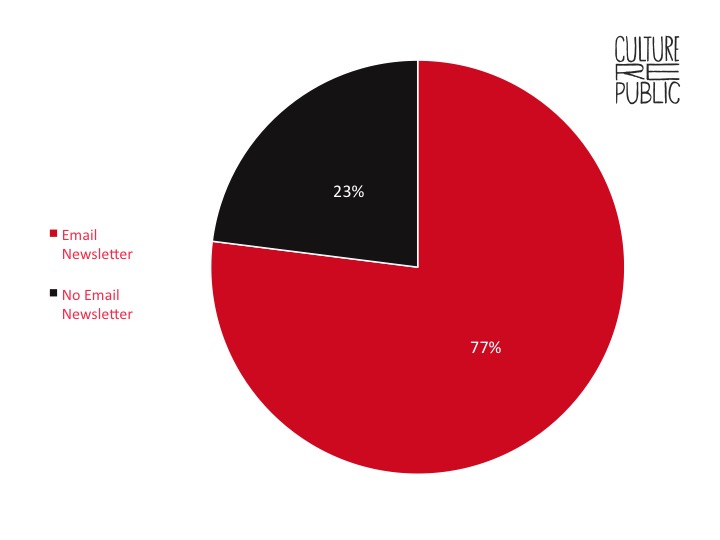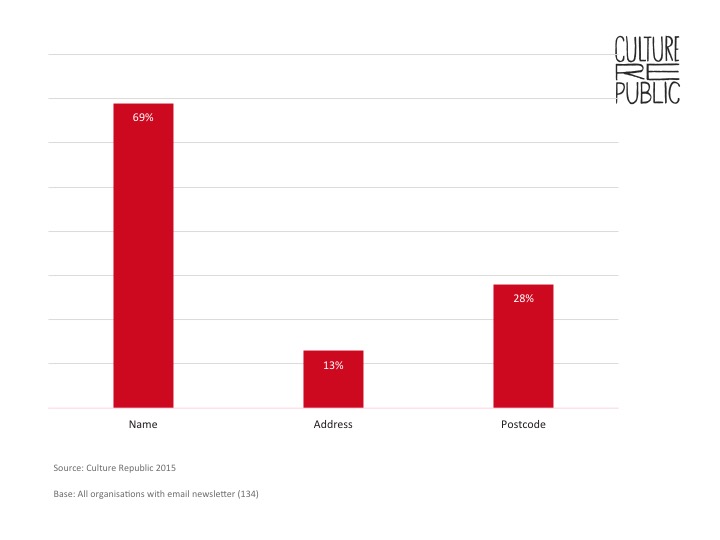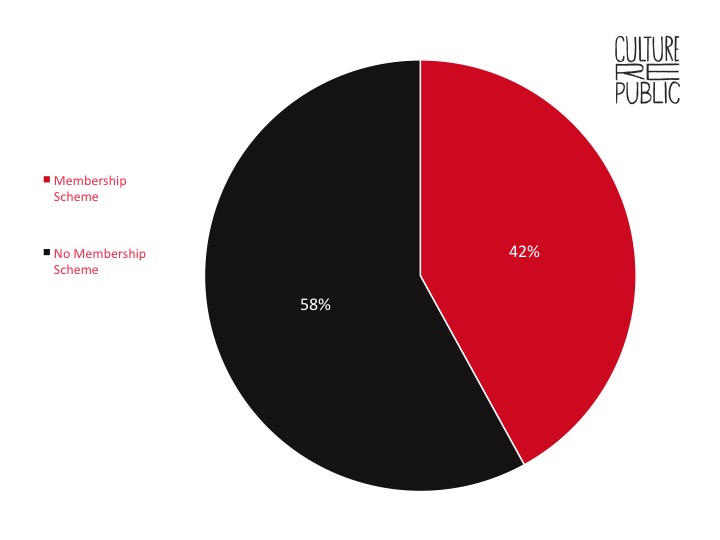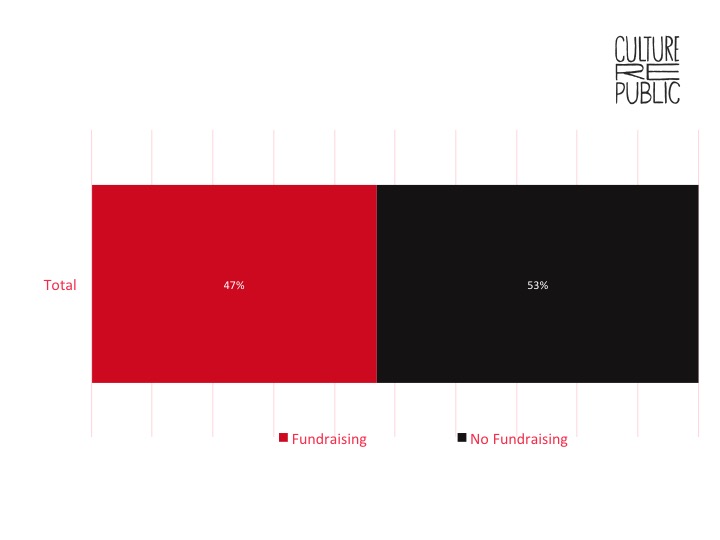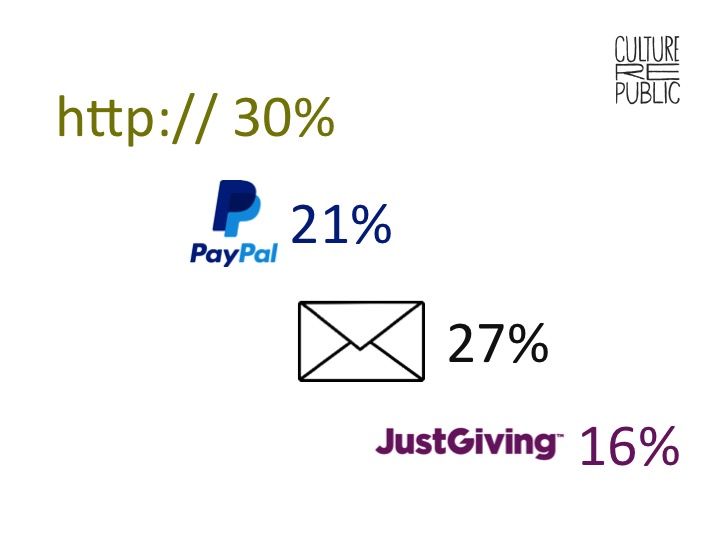The post Celebrating Diversity with our team appeared first on Culture Republic.
]]>One audience, many values
Whether at a theatre, an exhibition or writing a blog – we all know that everyone interprets events and information differently. However, insight helps us to shape our voice for different groups in society to be meaningful and relevant. On Monday, Paul from our team showcased the value of Google Analytics. Website analysis is a great way for understanding how audiences react towards your message. Tuesday, saw Kemi delve into the social media engagement with some useful insight into how social media opens up the world to more debate and real time information. This was a celebration of our need to be different but share our common values with others…
Just going out for the messages
Think about how you talk to your colleagues, your parents, your child or even your neighbour. We adapt our language (verbal, body, written) to whom we are talking. In our world of arts and culture marketing it’s no different. On Wednesday, Ashley nailed the value of getting a content plan in place. It’s important as part of any marketing strategy; you are thinking of how to organise your time, segment your audiences and get the most impact from your content.
SEO – computer says no
Let’s be honest, there will be some technically minded types out there reading this thinking, ‘So what?’ SEO best practice with Eva from the team served up some everyday tips on how to ensure your message reaches a wider audience. Often when you think your message is creative and brilliant, algorithms take over and the cyberspace says ‘NO’. A uniform and structured approach to keywords and content on your website will help your message gets noticed.
Here for you…
Success full teams have a ‘can-do’ approach and welcome a range of diverse opinion… people from all walks of life, with different personalities, coming together to share. The ‘Learn from Us week’ has been a great way of showcasing the wealth of knowledge within our team, for helping you grow your audience.
For November’s first Wednesday, Kathryn from our team will be presenting on Deprivation and Social Inclusion. SIMD16, a tool that can be used to invest in those areas that need it the most, and make it easier consider your own audience engagement practice in this area.
While we are on the point of diversity and displaying the “aye” in our team – I’d like to point you to The Learning Week with Matt Lehrman series. As an audience expert and strategist, Matt brings over a fresh perspective from the USA. Join us and Matt, for the jam-packed week of thought sharing and innovation coming to a city near you!
Don’t miss these useful articles and keep an eye out for Matt taking over our airwaves next week:
- Getting more from Google Analytics
- Social Media Engagement
- Content Hacks for the Win
- SEO Best Practice
- The Learning Week Audience Development Series
- Deprivation and Social Inclusion – An introduction to SIMD16
The post Celebrating Diversity with our team appeared first on Culture Republic.
]]>The post SEO Best Practice appeared first on Culture Republic.
]]>What is SEO Engine Optimisation?
Is the implementation of strategy and good practice to achieve high search engine rankings (SERP) which will in turn drive more traffic to your website.
What are those strategies?
Gone are the days of going keyword crazy, Google now use a different algorithm to inform rankings. Whilst keywords still have a part to play, you may be surprised to learn that one of the main drivers is valuable content. This is because the behaviour generated by users interacting with your content – such as shares and commentary- legitimises the authority of a page within Google.
Ensuring you have fresh and valuable content on your site has multi-fold purpose. It keeps your site engaging, whilst bolstering your authority within the field, this will encourage loyalty and returning visitors – which in turn drives rankings. Furthermore, content that contains the relevant subject matter will naturally contain the keywords and phrases that are used in searches.
Do your research
As keywords still have a part to play in the Google algorithm, Keyword Research should become an ingrained part of your campaign planning. Google AdWords’ Keyword Planner is a great research tool; however, the results are limited according to your account access. Do not despair as there are still a number of free keyword research tools out there, such as: https://serps.com/tools/keyword-research/
TOP TIP – Know your market:
Go one step further and Keyword Planning can actually be incorporated into your competitor analysis. Within the browser, navigate to Developer > View Source and simply enter the term ‘keyword’ in a search bar. It will highlight the terms that your competitor uses, giving invaluable insight.
Alt, Link, Repeat
Images need to have alt text (or alt tag) attributes. This has the duality of making them readable by screen readers for the visually impaired, but also by Google, so that it can identify related topics. Images are part of the multi-media content that Google loves to lap up, so labelling them correctly and giving them alt tags is essential.
Be sure to have outbound links to relevant high-profile pages, ideally ones that link back to your own site. Reviews, popular blogs and listing sites are good examples of this. This cyclic nature of authoritative sites linking to your own and back again, is highly valued by the Google bots.
Yoast so simple
If your site is created in WordPress, be sure to add the free Yoast plug in. It has a simple interface with a nifty traffic light system, which assesses your SEO and identifies pointers for improvement. For bespoke sites, created in code-free programmes such as Muse, there are still options to add metadata within each page as well as alt tags and titles.
If you haven’t already, be sure to read the rest of our Learn From Us series below. Don’t forget, we will be bringing Matt Lehrman, an internationally respected expert on audience engagement, to Scotland for a three city tour from 31 October to 2 November 2016. Remember we are here for additional consultancy too. Contact us to discuss.
The post SEO Best Practice appeared first on Culture Republic.
]]>The post Getting more from Google Analytics appeared first on Culture Republic.
]]>Google Analytics is a great way to help you grow your audience and generate new bookings, review your content strategy and provide insight into your campaigns. We all want to truly find our audience, Google Analytics can help. You should be using it daily, but are you? Make that change today, here are some handy tips:
Know the lingo
Ever feel a bit left out of the conversation? Get to know the lingo – it’ll help you understand what GA can do and help you make informed decisions on what the key measures mean. I’ll start with two of the basic measures that often confuse people. Bounce vs. Exit rates.
- Bounce Rate – The bounce rate has nothing to do with a ball. It’s the potential customers on your website and they might be leaving your site without finding out more about you. This is the percentage of people who go to just one page on your site and then leave. If you have a high bounce rate, there’s not enough interesting things or tabs to keep them clicking on other pages to find out more about you.
- Exit Rate – Exit rate is the page that is the percentage of people that left your site on that specific page. It could be the 1st or 31st page on your site they have looked at but, importantly, it’s the page they left on. That’s what makes it different from the bounce rate. Exit rate is useful because you can identify if pages on your site are putting people off your organisation. Or it might even flag a technical problem with the page e.g. ‘sorry this page is not loading’. Check your exit % out today.
Does your content need work?
Google Analytics is a great tool to measure the behaviour of people looking at your website. This is especially useful for your Newsletters. On Google Analytics: Click Behaviour – Site Content – All Pages. On All Pages you can search for keywords on your URL for a specified time period. You can drill down to what content is most popular on your site, what pages put people off, what is the average time spent on the page, how many unique visitors you’ve had. It’s golden information. Everyone has an idea about what content they think works for their audience, THIS IS YOUR EVIDENCE. It helps to shape content strategy going forward.
Top Tip – Give your URL pages unique names. E.g. If you are promoting ‘Google Analytics Advice’ have your URL as www.culturerepublic.co.uk/trends/googleanalyticsadvice (I’ll be checking open rates for this news piece and hope you don’t bounce or exit here, so don’t hurt my feelings :( ) not www.culturerepublic.co.uk/1234242 – this will help you to run a search for it on GA.
Set Goals on Google Analytics
Goals will tell Google when something you wanted to happen actually happens. So your websites are likely to be used to generate leads, and/or ticket sales. If you have a website where you sell tickets, you’ll want to create a final thank you or confirmation booking page for visitors to land upon once they have completed a purchase. By setting up a goal to track the thank you page – you can tell as and when someone buys your tickets. Useful for finding out your key sale times and plan to promote events accordingly.
Getting more with Google
If you would like to find out more about Google Analytics, let’s talk at the Learning Week in November. I’d be happy to take a look at your site and give you some advice. Remember we are here for additional consultancy too. Contact us to discuss.
The post Getting more from Google Analytics appeared first on Culture Republic.
]]>The post How to get started with Marketing Automation: April’s First Wednesday appeared first on Culture Republic.
]]>It might sound like it’s all about computers and machinery but ultimately MA is about building better relationships with people. The software can improve your data collection, giving you greater insight into who your customers are and how they interact with you. It also makes it easier for you to put this audience data to good use, as it makes it possible to tailor the user experience automatically. This personalisation is vital to nurturing prospects and converting them into regular customers.
The technology also helps you to analyse whether what you’re doing works and identify room for improvement. Crucially, it allows marketers to illustrate their value. By bringing all your marketing tactics together in one place MA enables you to quantify activity, measure impact and calculate ROI more efficiently and accurately.
Marketing automation, however, is not a ‘press and go’ software. It takes time to understand, to prepare for and to find the right platform. In this blog we share Stuart and Sarah’s advice on taking your first steps into marketing automation:
Plan
Time spent planning is crucial as MA will magnify, not solve, any inefficient processes you might have. To make it work you’ll need a comprehensive strategy that integrates the right processes, people, content and data. So, before launching a MA campaign you should answer some key questions:
- What are your goals?
- What strategy will help you reach these goals?
- Who should lead on the project?
- How will you measure success?
Research
There are a range of MA platforms available to you. Marketo, Pardot and Hubspot are often referred to as the leaders in marketing automation software. These are big platforms with powerful functionality and they come with a big price tag to match. Mailchimp, Instapage and Leadius are three cheaper options. They lack some of the capabilities of the bigger platforms but can be a nice introduction to the world of MA. Before making your decision use free trials to find out the pros and cons of each platform and determine suitability for your needs.
Start small
Don’t be overzealous in your ambitions. Whilst MA offers a lot of tempting features it is also a large investment in terms of money and time. Rather than paying out for software you don’t need, begin by experimenting with one or two MA features. For example, you could test out the automatic email function in Mail Chimp, see what results you get from that and go from there.
And remember, if you need help identifying your audiences or planning a marketing approach we’re here to help. Give us a call or send us an email – we’d love to hear from you.
The First Wednesday discussion continues next month when we’ll explore augmented reality with Trevor Jones and David Oaxly of CreativTek. First Wednesdays are exclusively available to Culture Republic Partners. Get in touch if you’d like to find out more about these events or our partnership offer.
The post How to get started with Marketing Automation: April’s First Wednesday appeared first on Culture Republic.
]]>The post Archived: April First Wednesday appeared first on Culture Republic.
]]>Marketing automation might be the most prevalent of all marketing buzzwords among marketing professionals today. But what actually is it and how could it help your organisation?
At a fundamental level, marketing automation is about optimisation.
In this First Wednesday session, Sarah Johnson and Stuart MacPherson will join us from Edinburgh-based creative agency, Whitespace. They will take us through marketing automation in more detail, addressing some of key areas and questions to think about to help you determine if it is right for your organisation.
We will be covering:
– What is marketing automation?
– Why is marketing automation the latest buzzword of marketing professionals today?
– What can marketing automation actually do?
– How can it be useful to your organisation and business?
– What software options are out there for you, and which one is right for you?
– Next steps: moving forward with marketing automation
Why you should attend
Learn about some marketing automation best practices, tools and solutions to assist in achieving better results from your marketing activities. Automation platforms largely automate far more than just marketing. See how other facets of your business can tie in with this fast developing side of marketing.
This First Wednesday is ideal for any key stakeholders involved in growing their audience and business: Marketing Managers, Operations, General Managers and Box Office Managers.
Agenda
12.15 – Arrival, brown bag lunch
12.30 – Welcome & introduction
12.35 – Partners introduction round the room
12.40 – Sarah Johnson and Stuart MacPherson, Whitespace
13.45 – Q&A
14.00 – End
Meet the speakers
Sarah Johnson – Head of Digital Marketing at Whitespace
Sarah has over 10 years of experience in digital marketing, specialising in building digital strategies that deliver real results.
She started her career in search engine marketing, creating and running SEO and PPC campaigns for SMEs that were directly focused on driving sales and onsite conversions. This developed her love of statistical analysis and using digital channels to deliver strong ROI.
Sarah heads up the Digital Marketing team at Whitespace, delivering bespoke digital strategies for clients’ and creating high performance traffic driving and content marketing campaigns that encompass all elements of the digital marketing mix, including advanced marketing automation.
Sarah believes that data should be at the heart of every digital activity, constantly driving the evolution of your strategy to achieve your organisational goals.
Stuart MacPherson – Digital Marketer at Whitespace
Stuart has over 7 years of digital marketing experience in running integrated digital campaigns.
He has worked both client- and agency-side on a range of projects including writing and managing social media, content and branding strategies; managing on-going SEO and PPC campaigns; and project managing on multiple website launches and redesigns. He also has a background in running marketing automation programs through Hubspot, Pardot and Marketo.
Stuart has worked with a range of clients in the charity/third sectors, travel and FMCG with leading organisations such as Global Vision International (GVI) – voted Best Volunteering Organisation at the Responsible Travel Awards – and with the L’Oreal Group covering digital strategy for brands such as L’Oreal Paris, Maybelline, Diesel and Lancôme.
Current selected clients include RAC, Business Gateway, Oxfam, Aegon and Heriot-Watt University, focusing on data-led insights and strategies in delivering client results.
ABOUT FIRST WEDNESDAYS
Some of the most stimulating sessions take place when there’s the opportunity to step away from the pressure of a busy job, get together with colleagues and share learning.
That’s why we are hosting ‘First Wednesdays’ – a series of topical, bite-sized information sessions taking place on the first Wednesday of each month.
They are an open invitation each month for our Partners and industry colleagues to regularly drop in our offices to keep up to date with ideas and examples of useful practice we’ve gathered from across the country.
It might be as simple as hearing how other people have successfully tackled the same challenges you face building profitable customer relationships and wider public engagement or learning about the raft of new tools or approaches emerging daily.
Our goal is to inspire fresh thinking, expand current networks and focus on the Most Important Thing … to build new audiences and greater engagement.
If you can’t join us in person, why not sign up for a periscope registration. You will be able to tune in remotely so you can still hear from our speakers from wherever you are!
Join the conversation #1stWed
FAQs
Where can I contact the organiser with any questions?
If you have any questions prior to the event please contact us on [email protected]
The post Archived: April First Wednesday appeared first on Culture Republic.
]]>The post Is your website working hard enough? February’s First Wednesday appeared first on Culture Republic.
]]>First Wednesdays are monthly training and networking sessions for Culture Republic’s Partner network. This month we explored how to improve website efficiency. Brian highlighted the importance of tracking your own data. This is the best way to measure your website’s performance. Your own data will provide meaningful insight into potential issues and highlight opportunities for change and growth, as well as help establish a benchmark from which improvements should occur.
In this event summary we’ve focused on three challenges that organisations regularly come up against, how you can address these issues and some cost-effective tools to help:
- Search Engine Optimisation (SEO)
One of the most common reasons for organisations wanting to redesign their website is that their current version doesn’t rank high enough in Google.
There’s often a significant difference between what you think people are searching for, and what they’re actually searching for. You need to understand the difference before you can judge if your site is working.
Webmaster Tools (for either Google or Bing) are useful for identifying what users are really searching for. Free and easy to set-up, these tools help you monitor and maintain your site’s presence on search engines. They provide Click, Impression and Ranking information on keywords.
- Mobile
At Culture Republic we have seen a growth in mobile traffic over the past three years and it is on the rise. Our recent research into digital use in the arts sector, however, found that 47% of websites were not optimised for mobile browsing.
When it comes to mobile optimisation Brian suggested that the best place to start is simply to better understand how your website currently performs on mobile devices. Google Analytics will give you a good overview of this. Use the data available to you to provide objective input and to help prioritise any changes.
Brian recommended a range of tools that you can then use to make your site faster and more responsive. For example, you can check if your website is fast enough for mobile using GTmetrix or Google Developers. Both these free tools summarise how your site is performing and give guidance on how to make improvements. Simple changes, such as resizing an image or altering landing pages, can make a big difference.
- Users
It can be frustrating if users don’t engage with the site as you want them to. How do you make users read the right content, click the correct links or purchase tickets? Brian advocated considering exactly what you want users to do, and then eliminating any obstacles. This will be easier than developing a perfect solution.
There are lots of affordable tools to help you better understand your users’ behaviour. Crazy Egg, for example, generates a heat map based on the click behaviour of website visitors. This gives you a much better understanding of how people engage with your website and will help you to identify what works and what doesn’t.
Don’t forget that if you’re looking to revamp your website we can help. Get in touch for more information.
Follow us on Twitter @Culture_Public and join in the conversation with the hashtag #1stWed. You can also reach out to Brian @taitbw
The post Is your website working hard enough? February’s First Wednesday appeared first on Culture Republic.
]]>The post Google, Facebook and Twitter 2015 roundup for marketers appeared first on Culture Republic.
]]>Livestreaming is the new black.
Twitter’s most significant launch was early in the year. Periscope – a mobile livestreaming app allows any Twitter user to broadcast a live event to other users. Like Skype, but one to many, the platform has built a significant user-base in its nine-month life according to Omnicore and this is set to grow significantly now that Twitter users can watch Periscope videos without leaving the Twitter app. Social Media Week’s piece on its launch advocates enthusiastically for Periscope’s potential applications for creative marketers.
UX changes
The look and feel of Twitter’s user interface – both within the web browser and in Tweetdeck – has been changing this year. Brand managers will have noticed that this summer account pages were stripped of wallpaper (which previously allowed you to fill the whole page – including the space at either side of the central tweet column – with an image) resulting in the loss of full-page, coherent branding. Check out Econsultancy’s summary of the best user responses to the change.
Late in the year the company changed their star shaped ‘favourite’ button to a love heart that indicates ‘like’. Twitter’s rationale for this change was that ‘not everything can be your favorite.’ It also brought their three major brands – Vine, Periscope and Twitter – into alignment. Although commentators like The Atlantic queried whether the change would do much to generate new users or improve Twitter’s sagging bottom line.
Hot now
Twitter’s new Moments feature helps people find important content, even if it is happening outside their core networks. Currently curated by Twitter and key corporate partners, the new service has potential for marketers. As Social Media Week’s guide points out, it’s a great place to link into external trends.
Live voting
People have opinions and Twitter’s new polls feature lets you tap into them. Polls stay live for 24 hours and offer a simple either/or choice. For now, it only works on the mobile app and in the web browser, so the Guardian is reluctant to embrace it fully but there’s a lot of potential there for content managers to get instant input into audience preferences in real time.
#GlobalEvents
Twitter is the best place for things that are of the moment – think live events, breaking news or political movements. See this at work in Twitter’s short film presenting the biggest hashtags of 2015, providing a flavour of Twitter at its most relevant. Capitalising on this strength, the company launched event targeting, accessed through the Twitter Ad portal. Marketers can browse a list of holidays and events by date, category or country and even give basic stats for the reach and demographics of each one. It’s good for forward planning, and Econsultancy’s got ideas for how agile marketers can put it to work.
Donate Now
The new fundraising button is big news for charities. Charity Digital News offers tips on how to use the ‘Donate Now’ button; introduces some early improvements to its functionality, and explains why Facebook is an increasingly important channel for nonprofits.
Ticket sales
Facebook’s ‘buy’ buttons are powered by Shopify, and this could be the year they make a real difference to your bottom line. Ad Week gives the lowdown on the pros and cons of Facebook’s e-commerce solution, comparing it with equivalent features from Twitter, Pinterest, Instagram and YouTube.
Video
Daily video views on Facebook passed the four billion mark last year and 75% of those were on mobile devices. With rich content opportunities all around us, that’s big news for arts marketers everywhere. An especially snazzy new development is the 360 degree video option, introduced in September. Check out the Royal Opera House’s Nutcracker video for a nice example from the arts.
Multicultural affinity targeting for marketers
If you’re targeting specific ethnic groups through your programming and comms this year, then Facebook’s new multicultural affinity targeting solution might help. Nanigans explains how Facebook now looks across a mix of inputs and preferences to help brands reach people of a specific ethnicity, based on users’ known content preferences.
Facebook Live
The Facebook response to Periscope and Meerkat is coming soon to a smartphone near you! Social Media Week introduced Facebook’s first steps into livestreaming.
… and finally …
Check out this handy infographic from Charity Digital News for a quick round-up of other key Facebook trends of 2015. All the changes seem to be working! According to Ad Week, Facebook’s ad revenue is up by 45%.
Most of us are grateful for Google’s constant algorithm tinkering when it means we get relevant results faster. For website managers looking to maximise their search results, though, it’s more of a love/hate relationship as Google’s changes often require a quick and appropriate response.
Twitter + Google = BFF
Early in 2015 Google partnered with Twitter to show tweets as results in our Google searches. The idea was to give up-to-date results for real-time events. Social Bro covered the initial roll out with a series of useful prompts for marketers to consider in the newly linked world. The feature subsequently expanded to include desktop and mobile results and, as the change bedded in, Social Media Week advised on how to optimise across the two channels.
Mobile optimisation is no longer optional
This year, Google rolled out a significant change to prioritise websites optimised for mobile browsing and the marketing world went crazy for Mobilegeddon as in this blog from Michelle Bassett. It happened because, as OfCom research showed, there was a significant growth in tablet and smartphone use – summarised in this visualisation from Charity Digital News. Although this was the most hyped update in recent memory, algorithm updates are Google’s bread and butter. It remains important to keep your eye on things.
More arts content
Near the end of last year, Google moved strongly into providing arts content by vastly expanding access to museum and performing arts materials via the established Google Cultural Institute. It has been highlighting artworks, world heritage sites and cultural figures since 2011. In 2015 the Institute launched significant partnerships with UK arts organisations:
Visual Arts and heritage: Google partnered with The British Museum to digitise the museum’s collection and allow you to tour the museum via Street View.
Performing arts: the Stage reported Google’s launch of over 150 interactive stories from drama, dance, music and opera that saw the platform working with the likes of like of the RSC, the National Theatre, Shakespeare’s Globe, Sadler’s Wells and Battersea Arts Centre. As with the Facebook videos above, the newest technology allows for an immersive 360 degree view of the performance taken from the perspective of the stage.
Arts organisations can partner with Google to digitise their collections and share an archive of their content. Arts marketers may find that audiences become more and more comfortable with (even growing to expect) high-quality online access to arts products.
Keep learning in 2016
If you want to improve your online marketing practice and learn how to create better online content, be on the lookout for our Know How workshop series launching in February 2016 with hands-on sessions including how to get the best from Twitter; creating great podcasts and more. Culture Republic Partners should also check out February’s First Wednesday where expert trainer Brian Tait will explore the perennial question, ‘Is my website working hard enough?’
Want to know more? Drop us a line to make sure that you get the word early.
The post Google, Facebook and Twitter 2015 roundup for marketers appeared first on Culture Republic.
]]>The post Archived: February First Wednesday Glasgow appeared first on Culture Republic.
]]>Tips and tools for optimisation and analysis with Brian Tait.
Website not contributing to the business in the way you’d like? Want it to contribute more, but not sure whether tweaking the existing site or starting from scratch is the way to go? When it comes to improving the performance of a website, finding where to start is often the hardest part of the process. With so many opinions on what works best, and so many experts pushing you towards the ‘best solution’, it can all get a little overwhelming.
Brian Tait of Aillum joins us for this First Wednesday session, discussing some of the most common questions and issues that trigger thoughts of a new website, and exploring some of the free (and low cost) tools available that can help you start to better understand how your existing website is performing, where it’s not performing, what your visitors are doing on it, and how to make changes with measurable results.
Brian will share his experiences of such tools, outcomes from using them, their potential worth, and how most businesses can use them to start putting some objective plans together to push forward website improvements.
We will examine:
- Common discussion points surrounding website improvement.
- The importance of using your own tracking and data.
- A range of free (or low cost) tools available to help answer some common website related statements and questions, including:
- “We don’t rank anywhere in organic search, our website is rubbish”.
- “Our website loads on mobile devices, we’re doing it right, aren’t we?”.
- “Visitors on our website don’t do anything, we get no leads from it”
- “I want to change it, but how do I know what changes will work?”
AGENDA
12.15 – Arrival, brown bag lunch
12.30 – Welcome & introduction
12.40 – Partners introduction round the room
12.45 – Brian Tait, Ailium
14.00 – End
BRIAN TAIT, FOUNDER & DIRECTOR, AILIUM
Brian is a self-described ‘web data geek’ – helping people understand what to track online, how to track it, how to monitor it, how to interpret what they’ve tracked, how to test theories established through tracking and, perhaps importantly, helping them towards a level where they can do it themselves!
A mixture of involvement in web development, organic search, paid search, social media, email marketing, PR, banner ads, affiliates and more led hiim to the conclusion that what people actually need is data, and an understanding of how to use that data.
Brian’s interest is in real data that you can use to make objective decisions about the development of your business online; to determine where to focus your time and to better understand where to focus your budget.
ABOUT FIRST WEDNESDAYS
Some of the most stimulating sessions take place when there’s the opportunity to step away from the pressure of a busy job, get together with colleagues and share learning.
That’s why we are hosting ‘First Wednesdays’ – a series of topical, bite-sized information sessions taking place on the first Wednesday of each month.
They are an open invitation each month for our Partners and industry colleagues to regularly drop in our offices to keep up to date with ideas and examples of useful practice we’ve gathered from across the country.
It might be as simple as hearing how other people have successfully tackled the same challenges you face building profitable customer relationships and wider public engagement or learning about the raft of new tools or approaches emerging daily.
Our goal is to inspire fresh thinking, expand current networks and focus on the Most Important Thing … to build new audiences and greater engagement.
Join the conversation #1stWed
The post Archived: February First Wednesday Glasgow appeared first on Culture Republic.
]]>The post Archived: How to REALLY use Google Analytics – with Brian Tait appeared first on Culture Republic.
]]>Speed up your analysis; get straight to the data you need and make sure that you’re collecting the best, most actionable information in a session that will fine-tune every aspect of your Analytics set up and usage.
Getting the best from Analytics is surprisingly simple when you know how: and the difference that it can make to your marketing intelligence is staggering. Expert trainer Brian Tait will look at all aspects of the tool from Admin functions (Annotations, Dashboards and Alerts) and Filtering (Segments, Dimensions and removing spam) through to Conversions (goals, values, conversion funnels) to make your daily use of of Analytics more efficient, useful … and even enjoyable.
We’ll finish with an open Q&A where you can air all your burning questions about the why, how and what of Google Analytics.
Who is it for:
The session is ideally suited to those already reasonably familiar with the Google Analytics, who’d like to get more from it. While the session will provide a quick initial overview of the interface, it’s main purpose is to highlight additional features and functionality that will improve your data collection and analysis, so it’s recommended those attending do at least have a basic understanding of Google Analytics.
Those most likely to get most benefit from the session include:
● Marketers responsible for pushing out campaigns who need better data to assist in targeting and / or to assist in reporting on performance.
● Site Managers / Marketers responsible for improving overall performance of the organisation website.
● Those involved in ongoing digital strategy development, to better understand opportunities and issues.
Just 25 places available so don’t miss out!
- Culture Republic Partners £50 (plus Vat)
- Culture Republic additional participants £25 (plus Vat)
- Standard, non Culture Republic Partner tickets £100 (plus Vat)
Please note that due to high demand we’re limiting registrations to two per organisation. As spaces are so limited we’re keen to be as fair as possible and give as many organisations as we can a chance to take part.
Agenda
12.45pm: Registration and Coffee
1.00pm: Overview of Analytics Interface
1.15pm: Setup – Keeping data clean
1.45pm: Admin Functions – Make your Analytics life easier
2.15pm: Filtering – Dig into your data
3.00pm: Break
3:15pm: Conversions – Track user interactions
3:45pm: Campaign Tracking
4.00pm: Open Q&A
4.30pm: End
Registration is at 12.45pm for a 1.00pm prompt start.
About Brian Tait
Brian Tait has been involved in and around the internet for 15 years, and has experienced a multitude of trends, developments, challenges and clients / companies at varying levels. From working for Public Sector organisations, a UK PLC, and a Glasgow based Digital Marketing agency, to setting up and running Aillum Ltd, clients and companies Brian has had the pleasure of working with include Whyte and Mackay, Renfrewshire Council, Littlewoods Bet Direct, Allen Carrs Easyway, Glasgow Caledonian University, Easyspace, Amchara and more.
With an interest in data and testing, Brian now spends much of his time educating others on how to setup, monitor and interpret data being collected, to help companies refine performance through a more objective lens.
The post Archived: How to REALLY use Google Analytics – with Brian Tait appeared first on Culture Republic.
]]>The post How digitally capable are Scotland’s arts? appeared first on Culture Republic.
]]>As a context-setting first step, we carried out desk research that looked at public facing operational functions carried out by arts organisations – things like whether or not an arts organisations’ website is optimised for mobile browsing or if they offer online ticket sales.
This effort was devised to operate as a kind of ‘dipstick test’ that would give us an early indication of how effectively Scottish arts organisations are operating online. Culture Republic looked at five key areas: organisations’ website, online ticket sales, organisations’ social media presence, the kinds of data that organisations capture and other sources of online income generation.
Broadly, through our work over the past decade with arts organisations we have seen a growth in areas of online business operations. This growth, along with the increasing cost of systems, brings with it a growing need for organisations to be vigilant about ROI of their business systems. A key and related concern here is around skills and capabilities of the staff members using these systems. Without the right skills the investment is not being maximised. We have seen cases of organisations with high powered systems that aren’t using them to their full capacity as well as cases of organisations that are forced to work inefficiently and waste effort due to inappropriate or inadequate business systems and both will reduce an organisation’s ROI.
The research exercise was devised to give us an insight into the kinds of digital systems that arts organisations are implementing as well as the kinds of training that staff might need to use these systems. For Culture Republic this gives a strategic indication of where organisations might need support and where we might help organisations to work together and learn from each other. Recent (and ongoing) changes in technology and the increased levels of consumer adoption of these technologies has created an increased potential for income generation for arts organisations through their online channels. But it is not clear that these increased opportunities are being exploited.
THE SAMPLE
Culture Republic researchers visited over 170 Scottish arts organisations’ websites. The sample includes all of the Creative Scotland Regularly Funded organisations, all of Culture Republic’s Partner and client organisations, as well as arts organisations from all across Scotland and a range of different art forms. This group was not selected to be representative of the full diversity of Scotland’s arts organisations – especially as it includes a much higher proportion of large organisations than is present in the Scottish arts sector as a whole. We selected this group because it is a good bellwether for wider trends and it in many ways forms the backbone of the wider network of Scottish arts organisations.*
WHAT DID WE LEARN?
Web
All of the 173 organisations in our sample have their own website. The functionality of these sites varies, however. We looked in particular at mobile optimisation. To find this, each organisations’ home page was tested. This test found that almost half of the organisations’ websites – 47% – were not optimised for mobile browsing. Even if the homepage is optimised, it may be the case that other pages on website are not. At a recent Culture Republic event – The Future of CRM and Ticketing – the issue was raised that even when the rest of a website is optimised, online booking pages are often not mobile friendly.
47% of arts organisations’ websites are not mobile optimised.
This is a significant weakness for arts organisations. The radical growth in consumers’ transition from desktop to mobile browsing means that the look and feel of non-optimised sites will be compromised. Moreover, search rankings are downgraded in Google’s updated algorithm if a site is not optimised for mobile browsing.
Ticket sales
In the next phase of the research, we looked at how many arts organisations offer online ticket sales. As this is not something that is relevant to all arts organisations – art galleries for instance may have a limited need of an online ticketing system – the sample for this section was limited to the 107 organisations for which it was relevant. This includes venues (performing and visual arts that hold ticketed events), touring companies and festivals. This phase of the research does not look into which online ticket sale system organisations are using. This question is being asked in the survey phase of the research, currently underway.
Most venues (89%) offer online ticketing.
As is clear from the table above, most venues (89%) offer some form of online ticket sales, the majority of them, 76%, through their own in house system. Although, there are still 11% of venues that do not offer any online sales. Touring companies are least likely to sell their own tickets – with 62% sending audiences on to an external ticketing site (mostly the venue) or Eventbrite and nearly a quarter with no online sales option at all.
Social Media Presence
The data table below shows that the vast majority of the organisations in our sample were active on the two main social media channels – Facebook (98%) and Twitter (95%). Although on both of the main channels there were significant outliers with more than one hundred thousand likes or followers, the average (median) size of a Facebook community is just over 2,500 and for Twitter it’s over 2,700. Interestingly, with Twitter we see no link between the number of Tweets and the number of followers.
Although Facebook and Twitter are currently the dominant social media platforms – with Facebook reaching almost half (49%) of the UK population and Twitter nearly a fifth (19%) according to Social Media London – Instagram is nipping at their heels with exceptional growth in the UK market. In our sample almost half (49%) of the arts organisations have started an Instagram profile and they are building audiences for their content. Importantly, the demographics for Instagram audiences skew younger so the audience reached on this channel is likely to be different than the one reached by Facebook and Twitter. As with Twitter, our research showed no correlation between the number of photos posted and the number of followers.
The most popular social media channels are Facebook and Twitter.
We also looked at other social media channels used by the arts organisations in the sample in addition to the big three above. The next most popular channel is YouTube, used by 35% of our sample, followed by Flickr (27%), Vimeo (13%), Pinterest (11%) and Google + (8%).
Arts organisations are also active on a range of other social media channels.
Finally, we also looked at organisations’ presence on Trip Advisor. Because this channel is not relevant to all organisations we used the same sample as in the Ticket Sales section above. In this group, we found that nearly three quarters (73%) are present on this channel. Trip Advisor is well worth thinking about: according to Business Insider “the site is now so big that its reviews can shift the tourist economies of entire countries” and moreover its power as a marketing tool can have a direct effect on a company’s bottom line.
Data Capture
This part of the exercise looked at the different kind of information that is requested when organisations undertake data capture on their websites. The sample for this section covers all 173 organisations. What’s most interesting about these findings is the wide range and relative lack of consistency we see in terms of data capture across organisations. Organisations in the sample were most likely to ask for email address information online. Over three quarters (77%) of them have an email newsletter sign up on their website.
77% of the organisations have an email newsletter signup.
The other most common data requested in online forms is, as shown by the table below, name (69%), postcode (28%) and other address information (13%). Some of the other pieces of data that we found were being gathered include: interests (usually in regards to selecting email newsletter contents), age, gender, phone number, how users heard about the organisation, profession, region or other general comments.
Only 28% of the organisations samples are collecting postcode data online.
These findings raise a few red flags. At Culture Republic we deal with data on a day-to-day basis and would advise organisations not to gather data that they do not actually use. There will be cases where there are good reasons for gathering some of this information we would advise any organisation against collecting much of this information ‘just in case’.
The relatively low number of organisations gathering postcode data (less than a third) is also concerning. With this one small piece of information arts organisations could access a large amount of useful market and demographic information, and the opportunity to do so is one that should not be missed. Of course, it may be that organisations are gathering this information at a later date, and such an effort would not show up in this research. It may also be that we are seeing the results of a wider trend away from capturing address and postcode data and toward email capture because organisations are looking to online marketing for more targeted and cost effective engagement. As arts organisations work to reduce the costs of their printing and postage costs, we know from anecdotal evidence that many are moving away from print brochures or are printing fewer for mainly non postal distribution, favouring brochure stands or door drops. Despite this move away from posting print brochures, Culture Republic does still encourage arts organisations to prioritise gathering postcode data on account of the intelligence it can reveal.
Income Generation
The final section looks at some of the range of tools for income generation used by all 173 Scottish arts organisations in the sample in addition to ticket sales. We looked at these because – in these post-recession years of dwindling public funding and an increasing push toward earned income – making money is on arts organisations’ minds.
This data primarily relates to online fundraising, membership schemes and online shops for merchandise. By fundraising we mean inviting donations online (via a button or any other call to action) but we do not include corporate sponsorship. By membership we mean any sort of scheme where a customer can pay to be a member and receive benefits – discounted tickets, discounted merchandise, etc. Membership should not be confused with a general ‘account’ that users can set up on an organisation website.
What we found is that over half (58%) of the organisations in the sample offer an online membership option. Though, this does not necessarily mean they do not offer a membership to loyal audiences.
42% of the organisations sampled offer a membership scheme online.
The slightly more popular way for organisations aiming to earn additional income online is through online charity fundraising. Whilst 53% of organisations are not doing any form of fundraising online, they may do fundraising in-venue or at events.
47% of the organisations sampled are doing some kind of online fundraising.
Of those that are fundraising online (base = 81) we looked in greater depth at the different ways that organisations are inviting donations. Nearly a third (30%) feature a ‘donate now’ button on the site, which simply adds money to an online shopping basket. Over a quarter (27% indicated by the envelope icon) use a direct method that includes paper forms to print out and post in or a link to a phone number to call to make a donation (not text giving via mobile). These invitations also solicited donations via cheque, direct debit or bank transfer. Other forms of online giving included services like: Pay Pal, Just Giving, Local Giving, The Big Give, BT My Donate, Virgin Money or Easy Fundraising. Additionally, in some cases users were also invited to sponsor a seat, add a suggested donation on during the ticket purchase process or to make regular Give As You Earn donations. See the figure below for the most popular methods of soliciting donations.
Nearly a third (30%) feature a ‘donate now’ button on the site.
The range of additional income generating systems gives a useful insight into the range of operational systems in use by arts organisations. These are important to consider and include because their presence speaks to the complexity of organisations’ operations and management and may well have a knock-on effect around overall efficiency.
WHAT’S NEXT FOR OUR RESEARCH
Culture Republic’s wider research project, which surveys arts organisations across Scotland is happening now. If you work in the arts in Scotland we would love for you to take 10 minutes to feed in and share your perspective.
The research will give insight into the types of information routinely collected from audiences and visitors; the range and use of ticketing and CRM systems in operation, and how digital technology is being used in creative processes, marketing, the delivery of cultural experiences, and organisational development.
It is designed to help us help the Scottish cultural sector. The research will show where there are gaps in knowledge and infrastructure for arts and cultural organisations across Scotland, and therefore help us create practical solutions and training programmes where necessary to increase resilience and capacity.
*The organisations that feed into the research survey will not necessarily be the same organisations that we looked at in the desk research phase. Although most of the organisations in the sample were invited to participate in the survey there has been a small amount of movement in the overall sample between the desk research and the survey phase.
The post How digitally capable are Scotland’s arts? appeared first on Culture Republic.
]]>